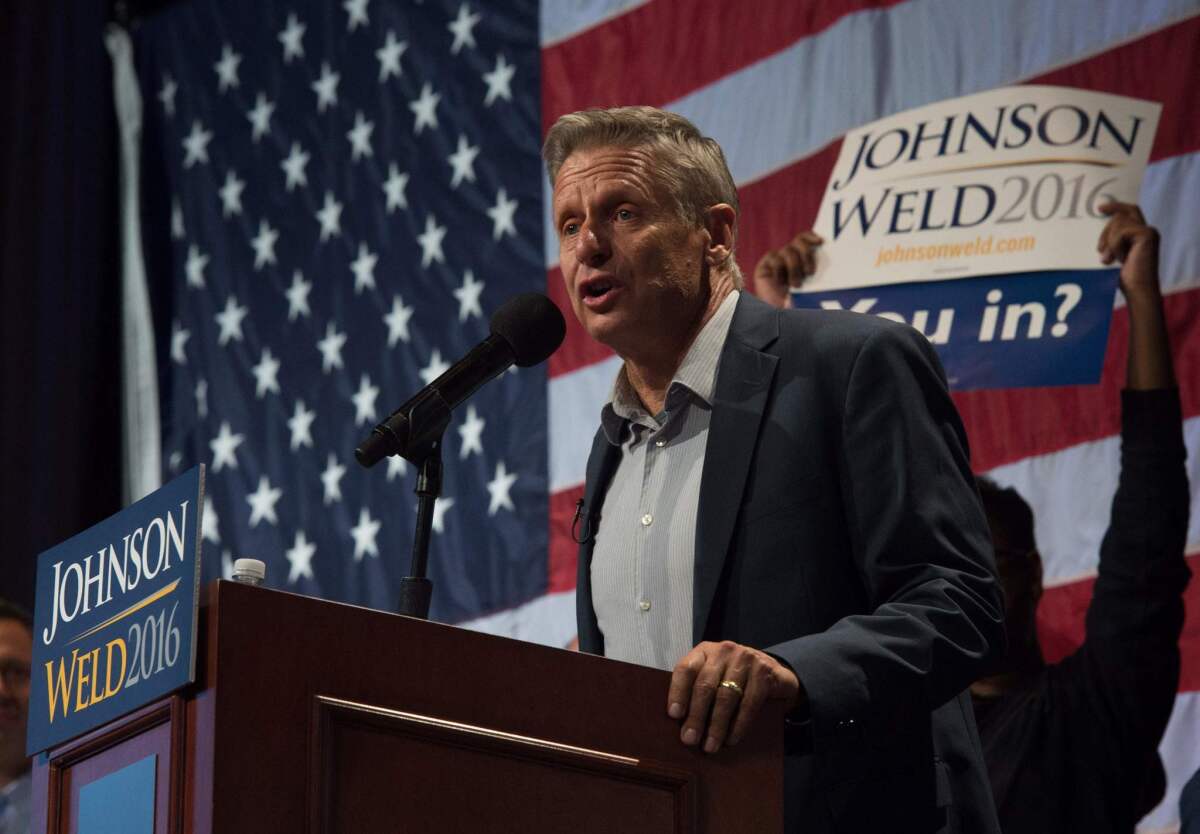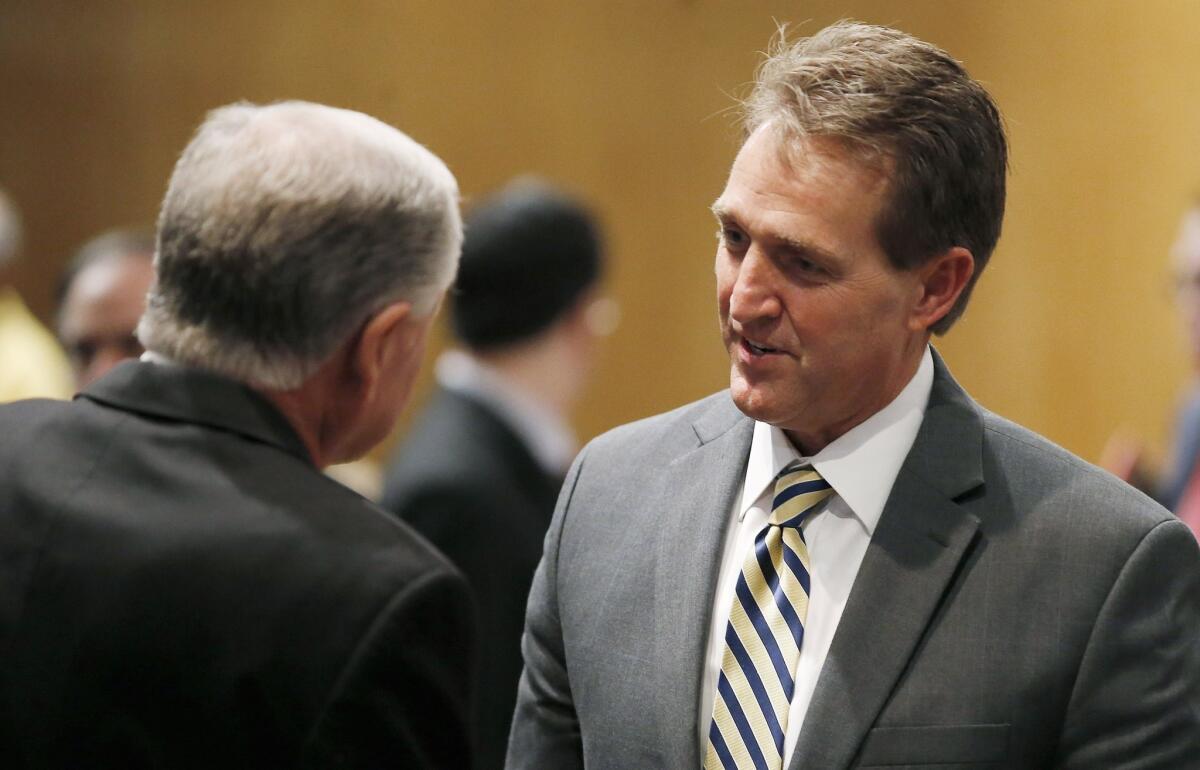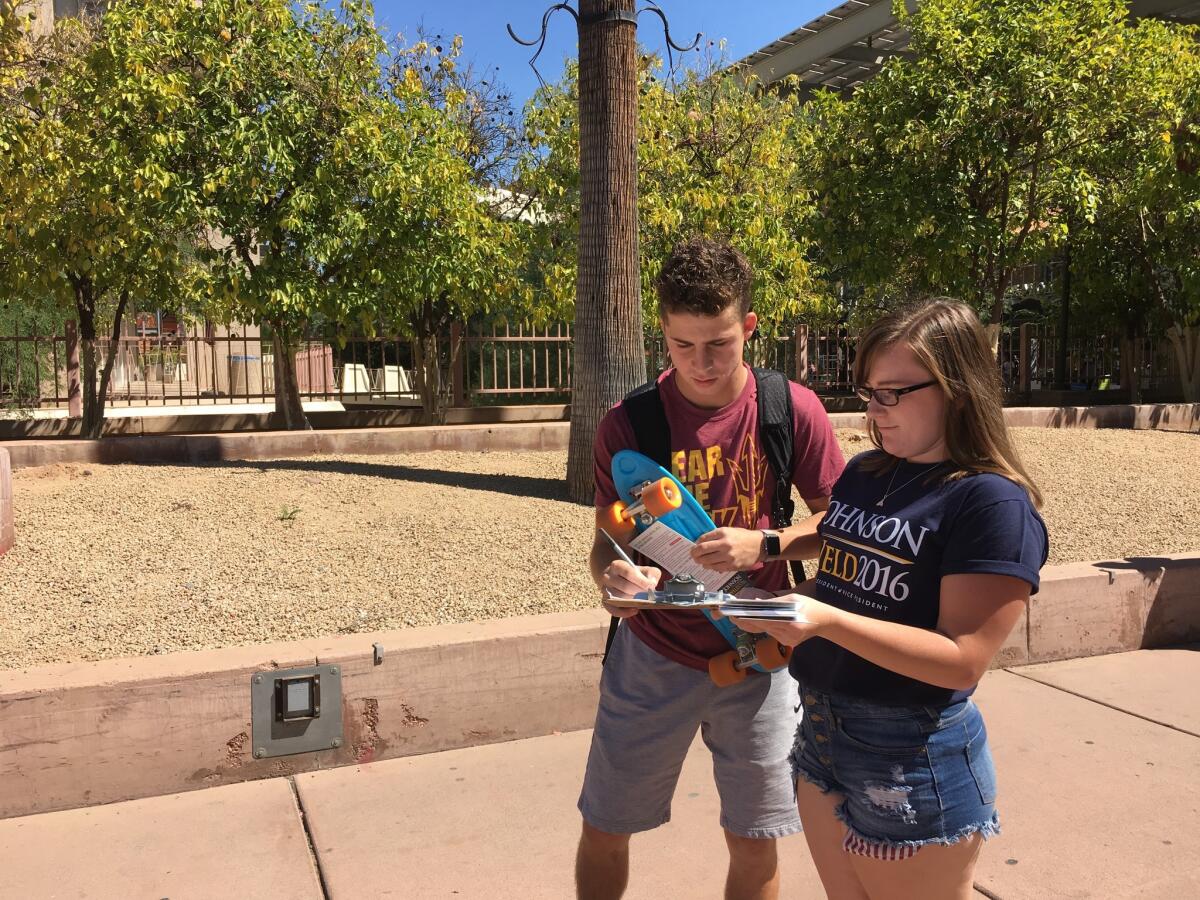The presidential race in Arizona was already tight. Then voters started noticing Gary Johnson

Libertarian presidential candidate Gary Johnson speaks to supporters at a rally this month in New York.
- Share via
Reporting from Tempe, Ariz. — Under a scorching September sun, Lauren McCarthy and Anthony Fraijo were unflaggingly chipper as they buttonholed Arizona State University students with one question: “Are you happy with the two major parties?”
The two recent college graduates were looking to coax voters over to a third option, the Libertarian presidential ticket of Gary Johnson and Bill Weld. And they were working doubly fertile territory of both Arizona, home to a particular strain of libertarian-tinged conservatism, and one of the nation’s largest campuses, full of millennials shown to be more open to outsider candidates than older generations.
That Arizona, a reliably red state, is seen as a potential battleground at all underscores the unpredictable nature of this year’s presidential contest, into which Johnson’s insurgent campaign has injected even more ambiguity.
Will he build on his party’s relatively strong standing here to siphon away would-be voters for Donald Trump, tipping the state to Hillary Clinton? Or will his appeal to younger voters peel off potential Democrats whom Clinton needs to pull off an upset?
Election 2016 | Live coverage on Trail Guide | Sign up for the newsletter | The race to 270

Gary Johnson is the Libertarian party nominee running for President. Here’s a look into how he got there.
McCarthy, 21, a registered Republican and recently converted Johnson supporter, said that short of an outright win, she’d be fine with either scenario — so long as the Libertarians factor into the outcome.
“The fact that we can start moving away from a two-party system — that’s a win,” she said.
Recent polls showed Johnson, the former Republican governor of New Mexico, fetching between 8% and 12% of support in Arizona, a marked improvement from his 2012 presidential bid when he notched just over 1% here. Jill Stein, the Green Party nominee, registered around 3% in recent polls.
Johnson is pulling a substantial share in a race that is unusually close for this Republican Southwest stronghold. Since 1948, Arizona has only sided with a Democrat in the presidential race one time, Bill Clinton’s 1996 reelection.
The GOP dominance belies an uncommonly strong libertarian presence in the state, fostered by a independent frontier mythos and personified by Arizona’s most famous Republican, small-government champion Barry Goldwater, the party’s 1964 nominee for president.
“There’s a general politics of leave-me-alone libertarianism that’s popular out West,” said Nicholas Sarwark, the chair of the national Libertarian Party, who lives in Phoenix.
While Republicans are the largest bloc of voters in the state, the faction of voters without a party preference trails close behind, edging out the number of registered Democrats.
“When you look at independent voters, they tend to vote conservative,” said Fred Solop, professor of politics at Northern Arizona University. Such voters, though, “are not fully behind the Republican Party. They’re willing to consider alternatives.”
Like most third-party candidates, Johnson must contend with being a relative unknown to many voters, particularly when compared with Trump and Clinton. His campaign was dealt a setback last week when he failed to qualify for the first presidential debate.
But Johnson’s campaign, powered mainly by volunteers and social media, will capitalize on any publicity. Even his recent gaffe in blanking on the name of Aleppo, the war-torn city at the heart of Syria’s protracted civil war, was a boost, backers ultimately concluded.
“Aleppo was a game-changer for us,” said Mike Hernandez, 44, a Johnson campaign volunteer, who noted the stumble led to a surge in Google searches for the candidate and offered Johnson a chance to pitch a noninterventionist foreign policy, a principle of libertarianism.
Similarly, his campaign could capitalize on high-profile defections from Trump among the state’s Republican establishment. Sen. Jeff Flake, one of Arizona’s most popular statewide politicians, has publicly tangled with the GOP nominee and says he cannot vote for Trump. Former Rep. Jim Kolbe, a Republican who represented a Tucson-area district for 22 years before retiring in 2007, is co-chair for Johnson’s Arizona campaign.

And one of the most prominent early moments of Trump’s campaign came last summer when he disparaged U.S. Sen. John McCain’s years as a prisoner of war in Vietnam. McCain, running for a sixth term in Arizona, has neither endorsed nor denounced Trump.
Trump’s candidacy, particularly his rhetoric on illegal immigration, spurred Dave Richins, a city councilmember from the conservative Phoenix suburb of Mesa, to look for an alternative.
“I’ve voted Republican my whole life and I despise Hillary Clinton,” Richins said. But contemplating a vote for Trump? “I just can’t do it.”
If Johnson drains once-stalwart Republican votes away from Trump, Clinton could get a boost, Democratic politicos say. They point to other factors tightening the race in her favor, particularly Arizona’s changing demographics.
Latinos make up 22% of Arizona’s eligible voters, according to the Pew Research Center, ranking it fourth nationally in Latino share of the electorate.
That bloc has typically underperformed in casting ballots. Analysts say a key question will be if Latinos are so galvanized by Trump’s inflammatory rhetoric on immigration that they turn out in droves, accelerating Arizona’s status as a swing state.
“Arizona is trending in the right direction,” said Andy Barr, a Democratic strategist not affiliated with the Clinton campaign. “We’re not really looking at being an on-paper battleground state until 2020 or 2022, but we’ve been provided an opportunity to speed up that process.”
The third-party presence may not entirely be a blessing for Clinton. In Arizona, like other states, Johnson is performing best among younger voters, who typically skew Democratic.
Johnson’s strong polling numbers among millennials have prompted alarm in the Clinton campaign; she made a direct appeal to the demographic this week, telling young voters “I need you.” And Vermont Sen. Bernie Sanders, her primary rival-turned-backer who was immensely popular with voters under 30, warned his supporters: “This is not the time for a protest vote.”
“Currently, there may be more of a bleed on the left, voters who otherwise probably may be for Clinton,” said Chuck Coughlin, a GOP strategist based in Phoenix.
As McCarthy and Fraijo, who both work on Johnson’s youth outreach team, spent a weekday handing out fliers at Arizona State, they found a generally receptive audience, though some were hesitant.

Brett Amaral, an 18-year-old from Surprise, Ariz., said his vote would go to either Johnson or Clinton and likely be based on “whoever I approve of more” on election day. He said he harbored the hang-up that voting for a third party was akin to throwing away his vote.
“It’s not going to happen,” Amaral said of a Johnson victory. “That’s why I’m more for Hillary.”
Johnson backers are familiar with the wasted vote argument. Third parties generally tend to fall off in the polls as election day nears and voters come home to one of the two major parties.
“I would imagine Johnson is peaking here in Arizona,” said Solop. “I don’t expect him to do better in the future.”
Follow @melmason on Twitter for the latest on national politics.
‘What is Aleppo?’: Gary Johnson’s misstep exposes shortcomings of his presidential candidacy
Clinton acknowledges that some voters’ dislike of Trump isn’t enough for her to count on their votes
More to Read
Get the L.A. Times Politics newsletter
Deeply reported insights into legislation, politics and policy from Sacramento, Washington and beyond. In your inbox twice per week.
You may occasionally receive promotional content from the Los Angeles Times.











